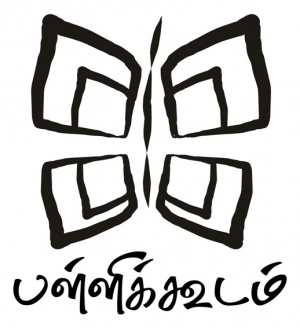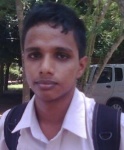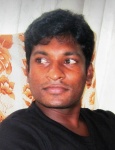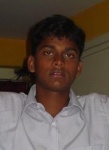Virtual Learning Environments
Pallikoodam (epallikoodam.org)
பள்ளிக்கூடம்
Online Learning Platform for Sri Lankan Tamil Speaking Students
Introduction
As the societies evolve into a knowledge society the need for higher and specialized education is increasing. The need for continuous learning, retraining and acquiring of new skills is becoming part of everyday life. Yet, the cost of education is increasing at an alarming rate, higher than food or medical costs. For a vast body of students quality education is simply unavailable and/or unaffordable. This is specially the case for many students from North and East of Sri Lanka, who have been deprived of vital educational resources due to the long civil war. There exist a significant youth population whose education was disrupted and need vocational training. Virtual Learning Environments (VLEs) made possible by emerging Internet based educational technologies provide a great cost-effective opportunity to bring quality educational resources to these students and youth.
Education plays a pivotal role in building an egalitarian social order. In order to carry forward our struggles for social justice and democracy, we should ensure that the communities that occupy the margins of our social order--the poor, the working classes, oppressed castes, women, ethnic and religious minorities, to name a few have access to free education. The attempts on the part of the state and global forces to privatize education pose a challenge to the social and economic progress of the weaker sections of our society. At this juncture, we need to think about building alternative educational systems that cater to the educational needs of the marginalized social groups. At the same time, we need to reflect on what constitutes "good education," keeping in mind the role education could play in the development and democratization of society and the state. We need to rescue education from neo-liberal forces that try to reduce it to the acquisition of certain soft skills. The alternative educational systems should empower individuals socially and economically, challenge oppressive ideologies of racism, casteism, classicism and patriarchy, highlight the importance of secularism and democracy and create awareness among the public, at the grass-roots levels, of sustainable development, environmental protection and human rights. "Pallikoodam," an educational initiative of Noolaham Foundation aims at creating an alternative, community-centered educational system among the Tamil speaking communities in Sri Lanka. Students from grades 1 to 13 in the primary and secondary educational systems will be benefited by this program. Even though it operates in parallel to the educational system centered around the schools, one of the central objectives of Pallikoodam is to combine formal education with vocational education and to promote education as a social good that has the potential to transform our lives and attitudes for the better.
With the evolution of society into a knowledge society, the need for higher and specialized education has risen. The need for continuous learning, retraining and acquisition of new skills has become a part of our everyday life. Yet, the cost of education is increasing at an alarming rate, higher than food or medical costs. For a vast body of students quality education is simply unavailable and/or unaffordable. This is specially the case for many Tamil students from the North and East and central hills of Sri Lanka, who have been deprived of vital educational resources due to the long civil war and economic exploitation. There exists a significant youth population whose education was disrupted. These youngsters are at the heart of Pallikoodam.
Pallikoodam aims at supporting the learning and teaching of different core subjects such as mother tongue, mathematics, history, science and technology. In addition, we are also interested in promoting English language and IT skills among the students. The emphasis on the acquisition of English language skills and information technology within the realms of education in the recent years has prevented us from looking at the ways in which education could be deployed to give birth to a progressive social order. On the other hand, we cannot do away with these skills, for they have the potential to bring together different communities divided along lines of language, culture and location easily and sometimes effectively. We need to identify news ways of using these skills to combat exploitative forces without succumbing to the agendas of neo-liberalism. Pallikoodam explores new avenues for teaching and learning these skills while stressing the political goals that the acquisition of these skills have to serve. Virtual Learning Environments (VLEs) made possible by emerging Internet based educational technologies provide a great cost-effective opportunity to bring quality educational resources to students and youth. Pallikoodam aims at offering quality education by creating Virtual Learning Environments for Tamil speaking students from the underprivileged regions in Sri Lanka. It helps a student have access to the Internet to proceed his/her studies anywhere and anytime. Environments such as peer-to-peer learning, social learning are included in the evolutionary part of the initiative. Virtual Learning will help those who are in need of self learning and those want to share their knowledge through the Internet.
Objectives
Mision
Combining formal education with alternative forms of education, Pallikoodam aims to create a virtual platform that supports and empowers students at the grass-roots level within the Tamil speaking communities in Sri Lanka and promote education as an avenue to strengthen the democratic foundations of society.
Objectives
- Create open, free, accessible, self-organizing virtual learning environments that could benefit students and educators, especially those from the marginal sections of our communities
- Bring together students and instructors from the different regions to a common virtual space and build communities of learners and teachers
- Encourage learning through discussion, participation and team work
- Stress the importance of vocational education and alternative forms of education alongside formal education
- Highlight the importance of education for the creation of a progressive society
Phases
Phase 1
Gathering and Organizing Virtual Educational Resources (Curriculum, Text books, Notes, Assignments/Exercises/Labs, Quizzes/Tests, Teaching guides)
The first phase of the project aims at bringing mostly text based educational resources to an online platform and making them accessible to students. This phase involves an outreach and engagement stage when the students will be informed of the ways in which they could use the resources.
It is vital to have a reference library for any learning environment. Thus, Pallikoodam has decided to create a digital library for VLE. Digital library has to be capable of providing students with the information/references they require in order to pursue their courses. For the students to access the contents easily, the sources included in the library will be cataloged on the basis of grades and subjects. The digital library will consist of publications by the Department of Education, SriLanka such syllabi, teacher's guides, textbooks and model/past exam papers. This digital library could be accessed by all the participants who are online. There are no privileges or restrictions.
In short, the first phase will be implemented at the following stages:
- Identifying relevant and suitable documents that should be digitized
- Digitizing the documents identified
- Mapping digitized documents to the syllabi
- Identifying available existing electronic materials to supplement student learning
- Implementing an open digital library using digitized content
Phase 2
Integrating Virtual Learning Management Systems (Courses, Video / Multimedia, Animations, Dynamic tools, Collaboration tools, Assessment, Administration)
The second phase involves building a more comprehensive virtual learning environment or classroom. Students will be able to supplement or completely learn courses online. Video lectures, self – assessment tools, collaboration tools and online based educational tools such as simulations are some key features of such a learning environment.
There are different technologies, methodologies and tools to implement virtual learning environments. But, selecting an appropriate and sustainable way to produce our virtual learning environment is more important to achieve our ultimate goals. A VLE, in general, includes question banks, video lectures, explanations through animations, online testing or experimenting tools. There are no boundaries to confine these tasks, for they evolve by time. Once a new trend or tool is identified, it will be included. We expect that a student should feel a classroom environment virtually.
In short, the second phase will be implemented at the following stages:
- Identifying teachers and resource people to implement the online learning platform
- Drafting instructional design for G.C.E O/L and A/L subjects based on the existing content
- Implementing the Instructional Design on a Learning Management System
- Introducing the platform to teachers and schools
Phase 3
Social learning systems (Self sustaining co-learning, Collaborating, Co-creating learning communities)
The third phase aims to build a robust self-sustaining online social learning community where student to student, student to teacher, teacher to teacher interactions will happen seamlessly. The diaspora can co-learn and collaborate with students and teachers in Sri Lanka.
A student feels comfortable with his/her learning as it takes place through useful interactions. Peer-to-peer learning and social collaborative learning are an integral part of these environments. Peer-to-peer learning happens through peer evaluation and peer knowledge supporting. This captures a particular area of virtual learning. Obviously, virtual peer-to-peer learning is more efficient as peers are self-motivated. Forums connect students, teachers and scholars at one place to share their knowledge and create an environment where information/knowledge passes through different communities. Learning, in these forums, becomes a collective and collaborative process.
In short, the third phase will be implemented at the following stages:
- Developing online examinations
- Developing appropriate interactive learning materials
- Introducing new learning styles
- Strengthening student collaboration
Phase 4
Linking Formal Education with Alternative Forms of Education (Clubs and Societies, English and IT Skills, Education of marginalize people, Mobile educational services)
The fourth phase connects the processes of learning and teaching outlined in the earlier phases with the larger social goals of the project. The focus will be on encouraging and guiding students’ collective participation in conversations directly related to their formal education and about the socio-political, economic and cultural issues that are closely linked to their lives and their communities. We anticipate that students’ contribution to the second set of conversations will create in them a comprehensive understanding of the roles education could play in building grass-root level movements for social justice and solidarity. Encouraging the students to explore the ways in which formal education and alternative forms of education could inform each other and strengthen each other, this phase aims at promoting knowledge as a means of empowerment.
The implementation of the fourth phase involves the following:
- Creating student organizations and associations where students can initiate activities related to their education on their own
- Organizing competitions and meetings between different groups of students
- Encouraging students to reflect on contemporary social situations and identify progressive and inclusive alternatives
- Building co-operation and solidarity among students across regional barriers
- Developing the computer and English language skills of the students
- Allocating resources in such a way so that we could support the educational efforts of students from the underprivileged sections of our communities
- Creating a mobile learning environment and integrating resources available in different locations
- Exploring special educational opportunities for the less-privileged
Projects
2013
- Initiation of Moodle for Sri Lankan Tamil Speaking Students
- Mathematics and Science Free Seminars to the Ordinary Level Tamil Students of North, East, Central and Uva Province
- Advanced Level Model Examinations for Science and Mathematics Stream 2013
2012
- Digital Library for School Students Pilot Project
Technology
Template:Virtual Learning Environments/Technology
Team
ConsultantsProf. Saba Jeyarasa | Prof. S. Chandrasekaram | Mathusoothanan Thedsanamoorthy | Shaseevan Ganeshananthan | Mahendran Thiruvarangan | Kanthasamy Sureshkumar
Technology TeamSarveswaran Kengatharaiyer (Mentor) | Sanjith Balachandran (Team Coordinator) | Burusothman Ahiladas | Erlilverl Kanagasabai | Paraneetharan Saravanaperumal
Operational Management TeamColombo : Thivatharan Jeganathan Project OfficersJasandan Ganeshananthan | Kajarupan Veerasingam | Vinujan Thayalan |
Resource Team
Colombo Jaffna Mannar Trincomalee Kilinochchi Badulla Mullaitivu Nuwara Eliya Kandy Batticaloa |
Organizations
Resource providers
Organisations helped through providing materials for reference library.
Zonal / Provincial Educational Departments
- Northern Province Education Department
- Zonal Education Department, Jaffna zone, Jaffna.
- Zonal Education Department, Islands zone, Jaffna.
- Zonal Education Department, Thenmaradchi zone, Jaffna.
- Zonal Education Department, Valikaamam zone, Jaffna.
Schools
- Kokuvil Hindu College, Jaffna.
- Jaffna Hindu College, Jaffna.
- Vaddu Hindu College, Jaffna.
- Stanley College, Jaffna.
- Hartley College, Jaffna.
- Karaveddy Vickneswara College, Jaffna.
- Nelliady Central College, Jaffna.
- St.John's College, Jaffna.
- Jaffna Central College, Jaffna.
- T / Koneswara Hindu College, Trincomalee.
- Badulla Saraswathy National College, Badulla.
- B / Banderawela Tamil Central College, Badulla.
Organisations in Collaboration
- Visions Global Empowerment, Los Angeles, USA
- Tamil Students of Uva Wellasa University
News
- An Introductory Event to Digital Library and E- Pallikoodam Programs (2014.02.23)
- Meeting with Tamil students of Uva-Wellasa University in acknowledging their service to ‘Pallikoodam’ (2014.01.26)
- Introduction of ‘Pallikoodam’ project at ‘Kurinchip Peravai’ event (2014.01.25)
- Meeting with Jaffna students awaiting for the Sri Lankan University Entrance (2013.12.15)
- Meeting with the Tamil students of Uva-Wellasa University (2013.12.15)
- Seminars for GCE (O/L) Students: Pallikoodam Collaborates with the Tamil Students of Uva-Wellassa University (2013.10.10)
- Pre-Examination Seminar In Mathematics & Science For GCE (O/L) Students (2013.09.19)
- Collaboration of ‘VISIONS GLOBAL EMPOWERMENT’ to Pallikoodam (2013.08.05)
- An Introductory Episode on 'Pallikoodam' Project at the 41st Literary Assembly (2013.07.20)
- Volunteers meet to discuss Pallikoodam initiative (09.03.2013)
- Discussion on the Pallikoodam Program (06.03.2013)
- Virtual School (Pallikoodam) Project awareness program at CFCD (12.01.2013)
- Noolaham Foundation has started a project to establish a Virtual School (01.11.2012)
Members Profile
Team Members
Strategy Team
Shaseevan Ganeshananthan
Shaseevan is the Founding Director (2008), Executive Director (2008 - 2015 ) and Board Member of Noolaham Foundation.
He is currently concentrating Governance & Policy, Organizational Strategy & Sustainability, Partnerships & Collaborations, Process Management and Oversight, Communications, Public Relation & Community Outreach, Resource Mobilization & Sustainability and Annual Plan and Monitoring.
Shaseevan was born in Jaffna, Sri Lanka in 1982.
He followed B.Sc. (Physics, Mathematics and Statistics) in University of Colombo.
He is a Member of British Computer Society.
He is a serial entrepreneur who has founded a corporate group of companies functioning in software development, digital marketing and business startup ecosystem that helps entrepreneurs, enterprises and investors to establish successful businesses.
He is located in Cambridge, United Kingdom.
Seran Sivananthamoorthy
Seran is Former board member of the Noolaham Foundation. Earlier he worked as a General Manager in Noolaham Foundation.
Seran was born in 1990 in Jaffna. He studied at the University of Moratuwa, Colombo. He was awarded with 'Ashoka youth venture', a global community of young social entrepreneurs, an award organized by the Ashoka innovators for the public. He has actively participated in various activities and held leading positions including President, Secretary etc in school level.
He is located in United Kingdom.
Kanthasamy Sureshkumar
Sureshkumar serves as Program Coordinator of the Virtual Learning Environment project. He was born in 1990 in Jaffna, Srilanka. He studied at Jaffna Hindu College. He is currently reading his engineering undergraduate degree in University of Moratuwa, Colombo, SriLanka.
He has contributed to school level Basket ball team and Cricket team. And he has led the basketball team for one year. He was awarded as Best Student of the year-2009 in his school days.
He is located in Colombo, SriLanka.
Technology Team
Sarveswaran Kengatharaiyer
Sarveswaran Kengatharaiyer is responsible for Virtual Learning Environments to Noolaham Foundation.
Kengatharaiyer Sarveswaran, known as Sarves, was born in Jaffna Sri Lanka in 1981. Sarves currently attached to the Department of Computer Science as a lecturer since 2011. He also serves as an eLearning consultant at this University since 2009. Prior to joining to the University of Jaffna, he worked as a Systems Engineer at University of Moratuwa and LK Domain Registry for 4 years. He has provided consultancies to Government and Private organizations while in Colombo. He holds B.Sc. in Computer Science from University of Peradeniya and Masters of Science in Computer Science from University of Moratuwa. Sarves has published research papers in conferences held in Sri Lanka and abroad. He has been in several conference organizing committees, including INET-Colombo. He received his secondary education from St’ Anthony’s College, Kandy and Jaffna Hindu College.
He is actively working on community empowerment. He is a co-founder/founder member of Yarl IT Hub, Nudpam, and ISoC-Sri Lanka organizations which work towards Community development and empowerment. Sarves serves in several executive committees, and holds positions including Director, President, Chairman, and Vice-President in different organizations.
His interests are Local Language Computing, e-Learning, and Natural Language Processing. He has led several Localization projects while at University of Moratuwa and he is a l10N committer of leading Open Source Projects including Mozilla, Joomla!, GeoGebra. He has conducted more than 50 seminars and workshops, mainly for Local Language Computing and Web development, for various levels of audience from school students, general Public to University professors. Sarves writes Technical Columns, essays, Technical Manuals in Tamil, and Short stories in his leisure time. He has authored/co-authored user manuals for Joomla!, Moodle and Mozilla.
He is located in Jaffna, Sri Lanka.
Operational Management Team
Vibhusikan Krishnamoorthy
He coordinates all the activities for VLE in Trincomalee.
He was born in 1990 in Trincomalee. He is currently following undergraduate degree at University of Moratuwa. He studied at Trincomalee/Sampaltheevu Tamil Maha Vidyalayam and T/R.K.M Sri Koneswara Hindu College.
He lives in Colombo, Sri Lanka.
Joynitharsan Punniyalingam
Joy is the Coordinator of Virtual Learning Environment program, Mannar.
Joy was born in 1989 in Mannar. He studied at St. Xavier’s boys’ National School. Currently, he is an undergraduate student of faculty of Engineering at University of Moratuwa. He is a member of university rowing team.
He is located in Colombo, Sri Lanka.
Saravanan Kanagaratnam
Saravanan is the coordinator of Virtual Learing Environment program, Jaffna.
He was born in kopay,Sri Lanka. He studied at Jaffna Hindu College. Presently He is following engineering under graduate degree in University of Peradeniya, Sri Lanka.
He is located in Kandy, Sri Lanka.
Gobithan coordinates Vavuniya district activities for Virtual Learning Environments program.
He was born in Jaffna.He studied at Vavuniya Tamil Central College. Currently he is following engineering undergraduate degree of University of Peradeniya, Sri Lanka.
He is located in Kandy, Sri Lanka.
<headertabs/>








